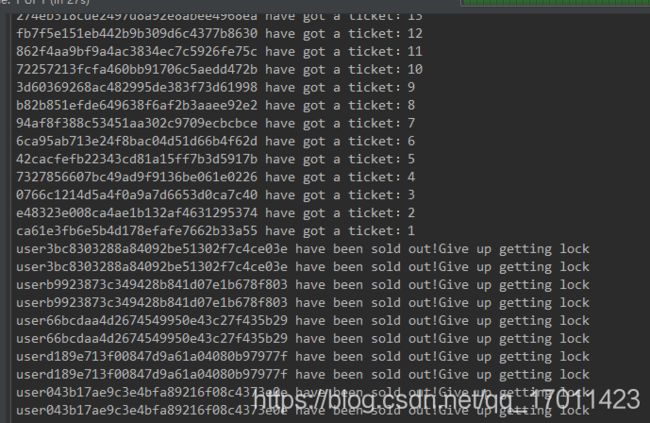redis分布式锁java实现
文章参考大神博客:http://www.importnew.com/27477.html
网上有很多分享分布式锁的代码,好多都不能用,或者测试有很多问题,自己结合大神的代码,有了以下这个版本的代码,并发500,25秒左右执行完,1秒执行20个请求,这只是在单机redis的情况下,当然因为是单机也没暂时没看率容错性,程序在并发5000的时候会出现JedisConnectionException,pool的里面没有connection的异常,线上的话还要考虑这个问题。
废话不多说直接上代码:
import org.junit.Test;
import redis.clients.jedis.Jedis;
import redis.clients.jedis.JedisPool;
import redis.clients.jedis.JedisPoolConfig;
import redis.clients.jedis.exceptions.JedisConnectionException;
import java.net.SocketTimeoutException;
import java.util.Collections;
import java.util.UUID;
import java.util.concurrent.CountDownLatch;
import java.util.concurrent.Executor;
import java.util.concurrent.Executors;
/**
* @author Wu zhiwei(Allen)
* @Title:
* @Description:
* @date 2018/10/24 11:31
*/
public class RedisTool {
private static final String LOCK_SUCCESS = "OK";
private static final String SET_IF_NOT_EXIST = "NX";
private static final String SET_WITH_EXPIRE_TIME = "PX";
private static final Long RELEASE_SUCCESS = 1L;
private static int ticketCount = 450;
public static JedisPool pool;
static String lockKey = getRequestId();
static {
if(pool == null) {
JedisPoolConfig config = new JedisPoolConfig();
//控制一个pool可分配多少个jedis实例,通过pool.getResource()来获取;
//如果赋值为-1,则表示不限制;如果pool已经分配了maxActive个jedis实例,则此时pool的状态为exhausted(耗尽)。
config.setMaxTotal(1000);
config.setMaxWaitMillis(1000);
//控制一个pool最多有多少个状态为idle(空闲的)的jedis实例。
config.setMaxIdle(50);
//表示当borrow(引入)一个jedis实例时,最大的等待时间,如果超过等待时间,则直接抛出JedisConnectionException;单位毫秒
//小于零:阻塞不确定的时间, 默认-1
config.setMaxWaitMillis(1000 * 100);
//在borrow(引入)一个jedis实例时,是否提前进行validate操作;如果为true,则得到的jedis实例均是可用的;
config.setTestOnBorrow(true);
//return 一个jedis实例给pool时,是否检查连接可用性(ping())
config.setTestOnReturn(true);
//connectionTimeout 连接超时(默认2000ms)
//soTimeout 响应超时(默认2000ms)
pool = new JedisPool(config, "10.122.46.33", 6379, 2000);
}
}
public static Jedis getJedis() {
return pool.getResource();
}
public static String getRequestId(){
String uuid = UUID.randomUUID().toString().replace("-", "");
return uuid;
}
@Test
public void test() throws InterruptedException {
long start = System.currentTimeMillis();
final CountDownLatch countDownLatch = new CountDownLatch(500);
Executor executor = Executors.newFixedThreadPool(50);
for(int i=0 ; i<500 ; i++){
executor.execute(new Runnable() {
@Override
public void run() {
try {
distributeLock();
} catch (InterruptedException e) {
e.printStackTrace();
}
countDownLatch.countDown();
}
});
}
countDownLatch.await();
long costTime = System.currentTimeMillis() - start;
pool.close();
System.out.println("it totally took:" + costTime + " ms");
}
public void distributeLock() throws InterruptedException {
Jedis jedis = null;
String requestId = null;
int timeoutCount = 0;
requestId = getRequestId();
while (true){
try{
jedis = getJedis();
break;
} catch (Exception e){
if (e instanceof JedisConnectionException || e instanceof SocketTimeoutException) {
//记录下获取多少次才获得jedis连接,并发很多的时候可能池里的连接不够而导致获取连接失败,所以这里循环获取
timeoutCount++;
//System.out.println("user:"+requestId+" getJedis timeoutCount={"+timeoutCount+"}");
}
}
}
if(tryGetDistributedLock(jedis, lockKey, requestId, 3000)) {
if (ticketCount > 0) {
System.out.println(requestId + " have got a ticket:" + ticketCount);
ticketCount--;
} else {
System.out.println(requestId + "the ticket have been sold out.");
}
releaseDistributedLock(jedis, lockKey, requestId);
jedis.close();
} else {
System.out.println("user"+ requestId +" have been sold out!Give up getting lock");
}
}
/**
* 尝试获取分布式锁
* @param jedis Redis客户端
* @param lockKey 锁
* @param requestId 请求标识
* @param expireTime 超期时间
* @return 是否获取成功
*/
public static boolean tryGetDistributedLock(Jedis jedis, String lockKey, String requestId, int expireTime) throws InterruptedException {
int timeoutCount = 0;
long currentTime = System.currentTimeMillis();
while(true){
try{
String result = jedis.set(lockKey, requestId, SET_IF_NOT_EXIST, SET_WITH_EXPIRE_TIME, expireTime);
if (LOCK_SUCCESS.equals(result)) {
return true;
}
if(ticketCount <=0){
System.out.println("user"+ requestId +" have been sold out!Give up getting lock");
return false;
}
/*//等待了60S以上,直接不再获取锁
if(System.currentTimeMillis() > (currentTime+ 60*1000)){
System.out.println("user"+ requestId +"等待了60S以上了,放弃!!!");
return false;
}*/
} catch (Exception e){
/*if (e instanceof JedisConnectionException || e instanceof SocketTimeoutException) {
timeoutCount++;
//System.out.println("user:"+requestId+" jedis.set() timeoutCount={"+timeoutCount+"}");
if (timeoutCount > 3)
{
System.out.println("connect error!");
break;
}
}*/
}
}
}
/**
* 释放分布式锁
* @param jedis Redis客户端
* @param lockKey 锁
* @param requestId 请求标识
* @return 是否释放成功
*/
public static boolean releaseDistributedLock(Jedis jedis, String lockKey, String requestId) {
//判断requestId相等时为了确定解锁和获取锁的用户是同一个用户
//lockKey是针对此业务的锁ID 执行成功返回1.
String script = "if redis.call('get', KEYS[1]) == ARGV[1] then return redis.call('del', KEYS[1]) else return 0 end";
Object result = jedis.eval(script, Collections.singletonList(lockKey), Collections.singletonList(requestId));
if (RELEASE_SUCCESS.equals(result)) {
return true;
}
return false;
}
}
我mock了500个线程并发访问,执行结果如图:

450张票卖给500给用户,当然有50个用户会买不到票,当票卖完的时候,还有剩余50个线程在竞争锁,有的还没得到锁,直接返回如上图,有的得到了锁,检查到票卖完了,如下图:

有任何问题请在下面留言,谢谢了!!!